Saskatoon Symphony Orchestra violinist and first-year law student, William Boan
Stories by Andrew Stobo Sniderman, JD 2014
Musical 'wunderkind' turns to law: William Boan
When the Moscow Ballet came to Saskatoon’s largest concert hall in November 2015, some 2,000 spectators listened to William Boan’s solo violin accompany the first dancer. It was among the biggest crowds he had ever entertained, but he wasn’t fazed—he had already played in that venue 50 times or so. He was only 20 years old at the time, but he had already been assistant concert master for the Saskatoon Symphony Orchestra for years, and practicing his craft since the age of two. The CBC called him a “wunderkind.”
Boan graduated from the University of Saskatchewan with a bachelor of musical performance, but after dazzling many audiences, including during that notable appearance with the Russian pirouette machines, he ultimately decided he would not be wholly fulfilled by a musical career. “I love music, but I suppose I realized that in today’s music industry it doesn’t seem like that would take me as far as I want it to,” he says.
Above all, Boan plays to play and to create art. It is, for him, really and truly about the music. “Fundamentally what you are doing when you perform, when you are making music, is creating art live,” he says. “You are attempting to do something personal and private, to express a true representation of your feelings, and it can sometimes get in the way of things to have people in the room. And if I am playing music for music’s sake, I don’t need to make a career of it. Whatever I do, I can play music too.”
So he got to thinking about what his career could be, and he chose law. “I love learning, I have a desire to understand things, and I want to help achieve correctness and moral rightfulness,” he says. The more he paid attention to “everyday happenings,” the more he saw the web of law around him. Now when he sees problems, he sees the law’s potential to resolve them. “So many problems have solutions that can be attained only through the law,” he says. “It is a fantastically powerful foundation in our society.” Even as a pre-1L, he completed an unusual amount of due diligence. Boan has already been reading the work of faculty members like Professors Benjamin Alarie, Albert Yoon, and Anthony Niblett.
Boan, whose favourite pieces include Sibelius’ Symphony No. 2, Stravinsky’s Firebird Suite, Korngold’s Violin Concerto and Bach’s Chaconne, intends to play music throughout law school. “I plan to maintain that part of my life,” he says. “Music will always be part of who I am.”
Storytelling her way to social justice: Karen Chen
When Karen Chen spoke at convocation for her graduating class at Northwestern University, she advised her peers: “Be nice, but also be fearless.” She might as well have been describing two of her own signature qualities. She has used her four languages (English, French, Spanish and Mandarin) to charm and interrogate as a journalist in four countries (South Africa, Canada, the United States, and China).
Chen grew up in Ottawa but completed high school in Beijing because her civil servant parents received foreign postings. After graduating from Northwestern’s illustrious journalism school, Chen worked for the Washington Post, then joined the investigations team at the Houston Chronicle. That’s where she dove deep into stories about industrial pollution and human trafficking. After a lethal leak at a chemicals plant that happened to be refining Canadian oil, Chen dug into questions of what the company knew, and when. Her work on that project won two national reporting distinctions. In another award-winning piece, Chen investigated a smuggling ring that used undocumented migrants as a supply of cheap labour to Chinese buffet restaurants across 29 states.
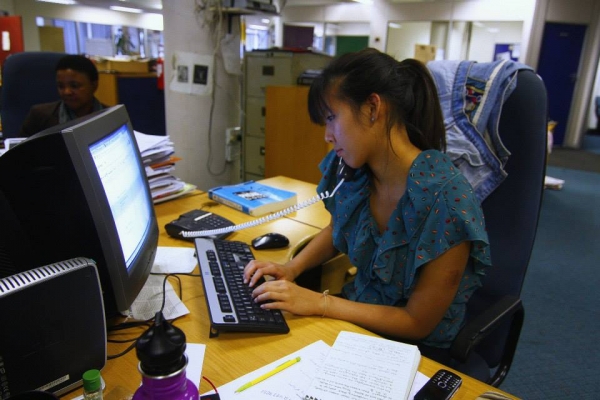
On deadline in a Johannesburg newsroom: 1L Karen Chen
Reporting these stories got Chen thinking about the relationship between journalism and law. “What drew me to journalism was a strong if naïve desire to change the world,” Chen says. “My newspaper work was meant to build toward impacting policy, but I started to envy what lawyers could do and I couldn’t. As a journalist, I can tell a story well. As a lawyer, I think I can do a whole lot more.”
Chen’s investigative work in Texas came to an end when her work visa in the United States expired and she came up empty in the official lottery for a new one. “For me it was a good opportunity to realize that not everything goes your way because you want it and you work hard,” Chen says.
Most recently, Chen worked as a radio producer at the CBC’s national evening show As it Happens. She was also a founding producer of a CBC radio program called “Out in the Open.” There, she reported on the case of Matthew Bullock, an African American who was dubiously accused of killing a white man in the 1920s. After Bullock fled to Canada, he was refused legal entry at the border, and though he found a way to Hamilton he was ultimately chased from Canada by KKK sympathizers. Chen attributes her fascination with the story to “the way it challenges the mythology of Canada being a freer and better place.”
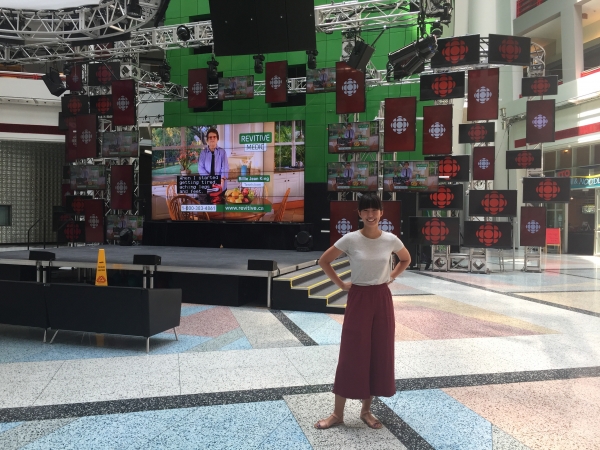
At the CBC Broadcast Centre
Chen plans to use her legal training to advance social justice. “Much of my family is from China, where there are often no rules about how people can be treated,” she says. “That has always weighed on me, because I can do something about injustice, but not everyone can.”
A 'magical life' alongside a love of law: Aaqib and Saqib Mahmood
Aaqib and Saqib Mahmood are brothers who use the word “we” rather a lot. This has something to do with the facts that they completed bachelor’s degrees in criminology and graduate degrees in socio-legal studies at York University together. They also run a magic business (“Mahmood Magic”), including slick routines in which they finish each other’s sentences, and they both volunteer extensively for a charity called Humanity First, whose local work included programs for Toronto’s homeless. Aaqib and Saqib also happen to be twins.
Aaqib and Saqib grew up in the United Arab Emirates, Saudi Arabia and Kuwait, before moving with their family to Vaughan, Ontario when they were 15 years old. “When we were growing up in the Middle East,” Aaqib says, “we saw many things that didn’t make sense to us”—things like workers with few labour protections, or women without the right to drive. “We came to realize that law confers rights and privileges,” he says.
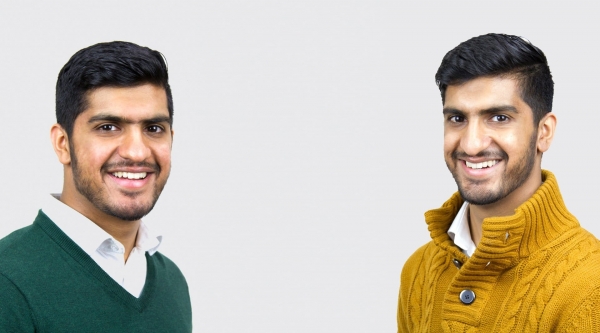
Aaqib and Saqib Mahmood
Saqib hopes he can use the law to “break down barriers” and create “proactive systemic change.” As Ahmadiyya Muslims, the brothers belong to a group that has often been the target of persecution. “As children,” Saqib continues, “we were told not to share our beliefs so that we could stay safe. I grew up with an omnipresent fear that bad things could happen to me because I belong to this particular group. That prevented me from doing many things I wanted to do, and from expressing myself. Later, we increasingly understood that this kind of persecution is not unique to one sect or religion. Many groups face persecution, and I think we have a little bit of insight into the experience of people who are oppressed.”
When the brothers moved to Canada, they were painfully shy and had no friends. That is when they took up magic, to entertain themselves and later their family. When they started the difficult transition into high school in their new country, magic became their icebreaker to meet new people. Over time, and after enduring many failures (“It is very awkward when you say ‘This is your card’ and it is not,” Saqib confirms), they managed to make plenty of friends and launch a thriving magic business.
For his graduate work at York, Aaqib researched discrimination against Muslim women in Canada. “When you speak to Muslim women, they share many examples of feeling marginalized because of their identity, like in employment and in public spaces,” he says. “Canada is not immune from Islamophobic beliefs existing and persisting in this country, and there is still work to do.”
As for Saqib, his research focused on ISIS propaganda videos targeting Muslims living in the West. “I am repulsed by ISIS, but many Muslims in the West feel empathetic to their cause and even join it,” he says. Saqib found that ISIS manages to create powerful propaganda by imbuing their message with a rich religious narrative. “They are able to make their message seem Islamic, though it is actually Islamist,” he says.
Aaqib admits that “on paper, it may look like we are same, but our personalities are quite different, and when people get to know us, will instantly know the difference.” He quickly adds, with a laugh: “Though perhaps in the first few weeks it may be a challenge!”
A champion of tennis--and Indigenous rights: Erika Voaklander
“You can’t escape law. You have to somehow interact,” says Erika Voaklander. She would know better than most: when the Supreme Court ruled in 2016 in the Daniels v Canada case that the federal government had to recognize and negotiate with the Métis Nation, the Court was speaking to her, her family, her nation. “Canada is moving forward, and I definitely think the courts have played a positive role,” she says. “The federal government can no longer ignore Métis peoples. Legal recognition helps—without that, there is less real pressure to commit and follow through.”
In previous generations, Voaklander knows Métis heritage was not always openly acknowledged because often “nothing good really came of it,” she says. “In my generation, I think it is easier to be proud of it, and we are more excited about reconciliation.”
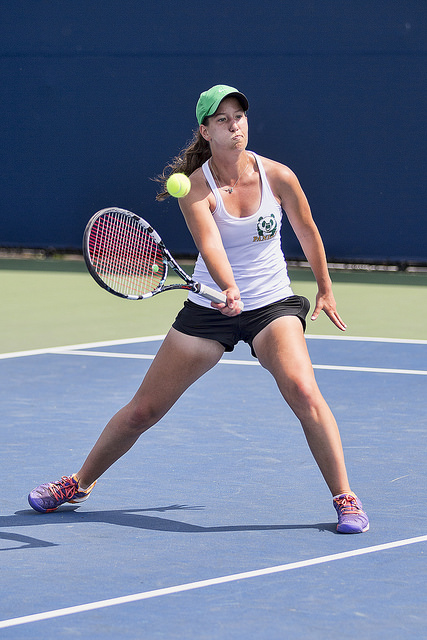 Tennis champion Erika Voaklander
Tennis champion Erika Voaklander
Voaklander was born in a hamlet near Edmonton, but peripatetic professor parents meant years in Prince George, BC and Melbourne, Australia, before she returned to Edmonton for secondary school. She graduated with a degree in math from the University of Alberta, where she also found time to be a dominant singles and doubles tennis player and help her team win a national championship. Her tennis idols include Serena Williams, for her dominance, and Billie Jean King, for her iconoclasm. More than anything else, Voaklander won by outworking and outlasting the opposition.
During her undergraduate degree, she was a teaching assistant for a course on Indigenous legal issues. She was struck by how little students knew about the noxious history of the Canadian government’s treatment of Indigenous population. “It became very apparent how pervasive the image of Canada as a perfect multi-cultural oasis is,” she says. “Some students struggled with the notion that they were raised in a country that is not the perfect place it claims to be, and when forced to recognize this reality, they were sometimes very defensive, hesitant, and struggled to challenge their beliefs.” After graduation, Voaklander became a direct participant in Indigenous self-government and worked with the Métis Nation of Alberta, as a project coordinator in the Health, Children and Youth department.

2014 University National Co-ed Tennis Team champions at U of A: Erika Voaklander with friends from the Bears (men's) team Tobiasz Strozyk (right) and Hernan Chavez-Posse (left).
As a student, Voaklander enjoyed and excelled at math proofs because solving a problem was a question of following logical steps. Now she has chosen law because she wants to “solve problems that directly affect human beings.” She recalls that when she heard about the outcome in the Daniels case, she knew it was good news. But, as is often the case with legal decisions, she and others in the community wondered what it really meant. The answers she sought were not forthcoming on social media. “But once a lawyer came into the community and explained the decision in layman’s terms, there was even more excitement,” she says. “Hopefully I can become a good enough lawyer to explain things to people like that.”

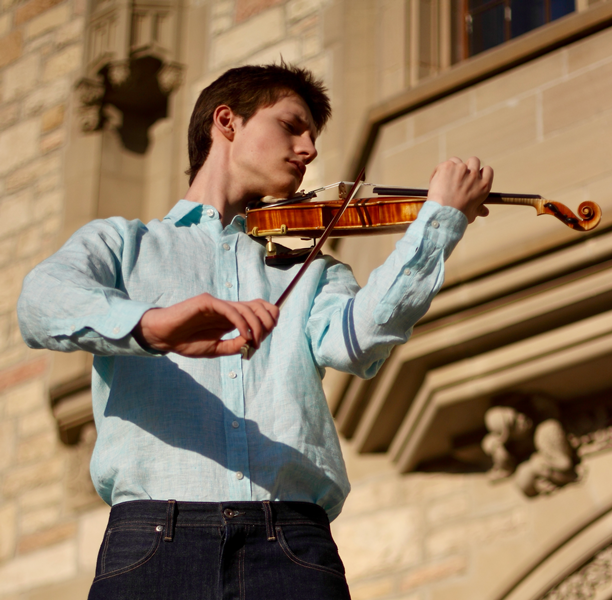



 Tennis champion Erika Voaklander
Tennis champion Erika Voaklander